
WHEN GUSTAVO MURO MARCHANI ARRIVED AT UBC OKANAGAN from Peru, he knew he wanted to apply his love for biology to solving the world’s problems.
The Bachelor of Science student gave himself the goal to compete in the International Genetically Engineered Machine (iGEM) Competition, an international synthetic biology event. Though UBCO didn’t have an existing iGEM team, Muro Marchani was determined to create one.
“It was my way of trying to build my degree around me,” he says. “Synthetic biology is combining engineering and biology, trying to create things that life has never done before and can be useful to solve global problems like climate change, pollution and mass extinctions.”
He adds that everything can be grown. “That’s the new mindset with the wonder of synthetic biology. Instead of mining or getting materials from different places that might harm the environment, you can grow it anywhere.”
Muro Marchani and his group’s project, Life Bulb, is a living light bulb that aims to generate light from organic material using bioluminescence and solar power. This creation is not reliant on electricity and can convert greenhouse gases into oxygen, making it a sustainable alternative to LED lights.
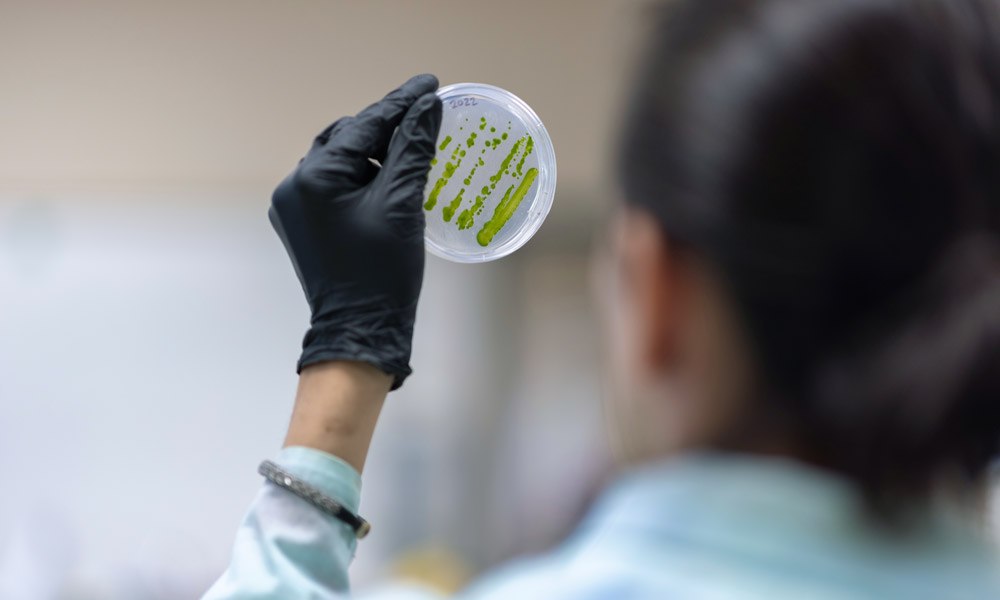
Smeared on this Petri dish are growing cyanobacteria colonies. These cells will eventually transform and glow with genes from fungi.
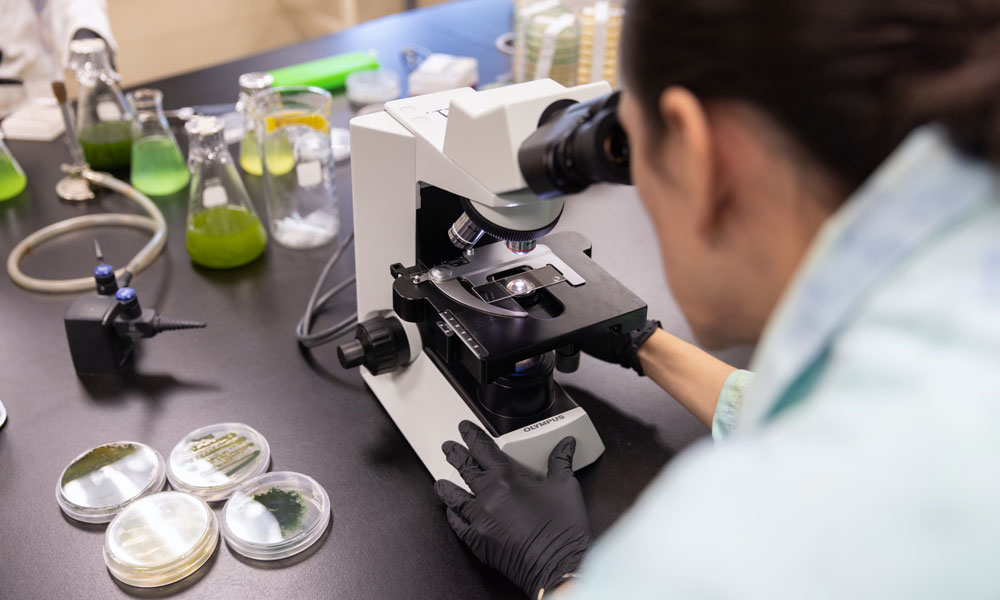
Here, different cyanobacteria cells are observed under the microscope to identify contamination. The researchers also want to ensure their genetic modifications are not adversely altering the cells’ growth.
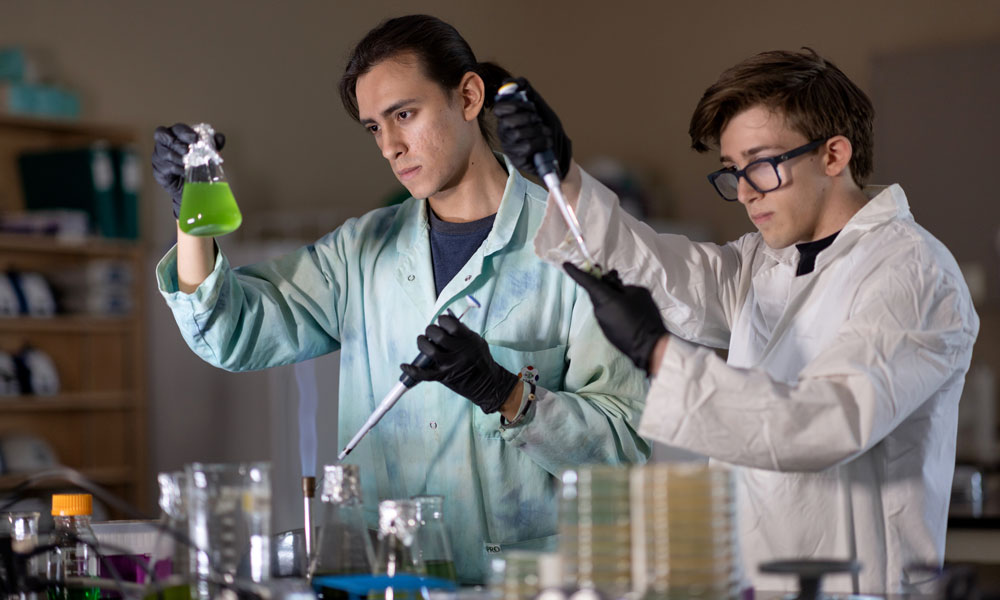
Cyanobacteria and genetically modified E. coli are being transferred with micropipettes into tubes, to be preserved at -80º Celsius. These samples will be viable for many years and future experiments.
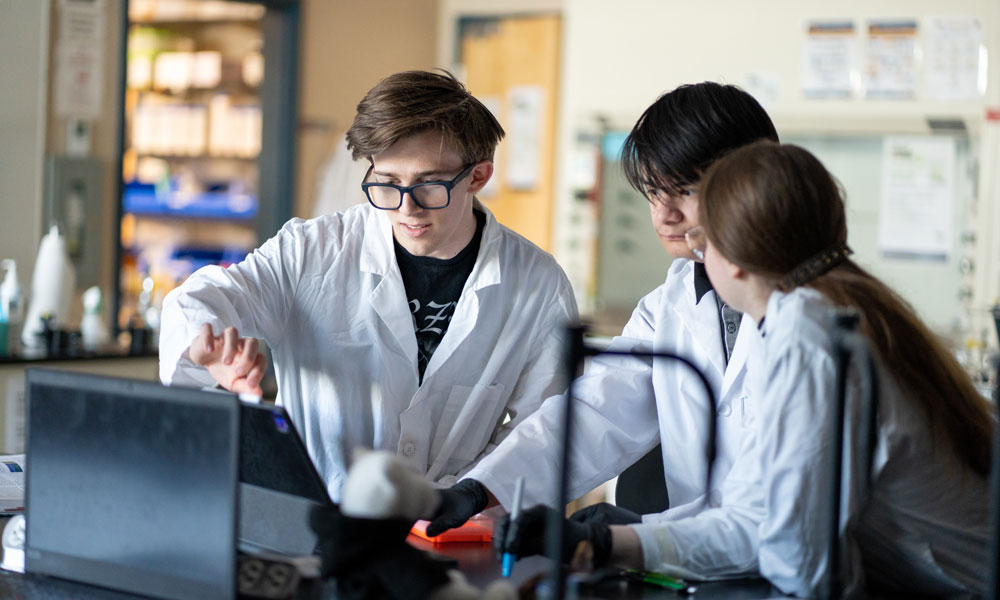
Student researchers examine the experiment protocols and genetic constructs on a cloud-base software, which ensures the team follows its plan for the experiments.
To build a competition team, Muro Marchani recruited other students and created the UBCO iGEM Club. This club aims to create a space for students and faculty of all disciplines to discuss and learn about biotechnology and synthetic biology as well as represent UBCO at iGEM. Since the nature of the iGEM competition goes beyond biology to include hardware, communications and arts, Muro Marchani built an interdisciplinary team from different academic backgrounds: biology, chemistry, engineering, computer science and management.
Not only was Muro Marchani passionate about giving students outside of science the opportunity to learn lab skills, he says they brought a crucial element to the team.
“If you don’t know about science, you don’t know what’s not possible. So those students brought new ideas,” he says. “As biochemists or molecular biologists, we have a specific point of view. But an engineer will have a different way of looking at things; same with a management student. So that was really important for us because there were lots of ideas coming in and out.”
Even for those students like Muro Marchani who had lab experience, the cycle of product development—meaning creating feasible ideas, designing experiments and hardware, and testing their product—was unique to this student-led project.
In regular coursework, labs have been tested and have predictable results as long as the students perform the techniques correctly. Dr. Isaac Li, an Assistant Professor of Biochemistry and Molecular Biology and one of Life Bulb’s principal investigators, says creating a new iGEM team gave students critical hands-on skills to design their own project and—like all researchers—troubleshoot in order to move forward.
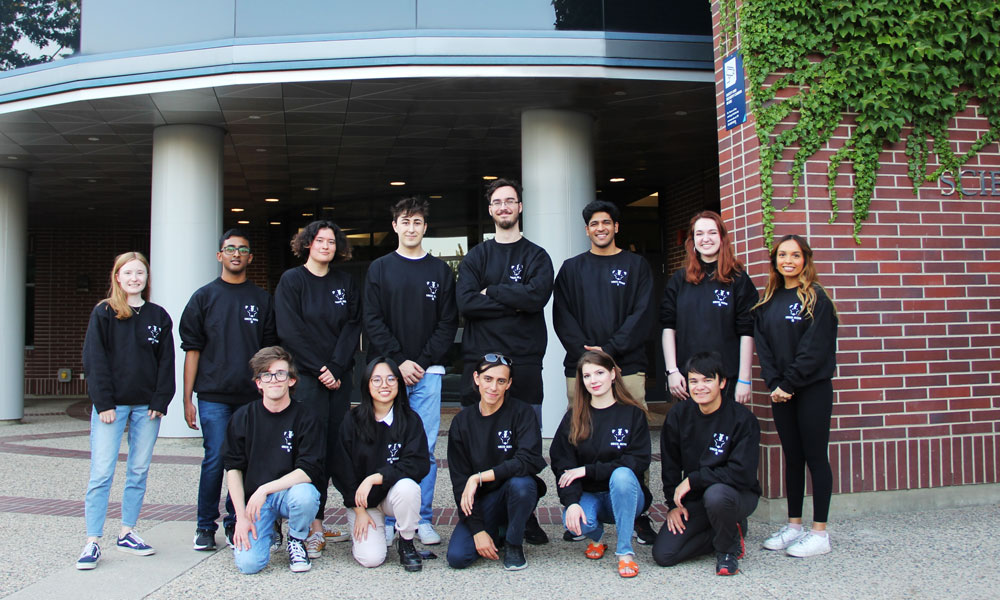
The UBCO iGem Club. Back row L-R: McKenna Yungling, Ankkit Prakash, Robin Blott, Josh Haiworonsky, Stephen Herbert, Osho Gnanasivam, Maddie Gebhardt, Srushti Parekh. Front row L-R: Ryan Riopel, Alyssa Kong, Gustavo Muro Marchani, Anastasia Bernaz, Trevor Fox. Absent from photo: Aziz Rakhimov, Tanner Pereschitz, Ravi Bullock.
As the students initially brainstormed ideas, Dr. Mitra Tabatabaee, the team’s other principal investigator, encouraged them to “think big, act big and take big steps.” Following Dr. Tabatabaee’s advice to think globally to solve global problems, the students ultimately came up with Life Bulb.
“We wanted to provide this alternative sustainable source that can be potentially carbon-negative by absorbing greenhouse gases. We hope Life Bulb can reduce the impact lighting has on our climate,” says Alyssa Kong, Bachelor of Science student and co-team director.
Currently, electrical light has a major impact on the environment, contributing to 20 per cent of global energy consumption and six per cent of global CO2 emissions. The intense brightness of electrical light through light pollution also negatively affects wildlife by disrupting habitats and migration routes.
Although Life Bulb is still in testing, the intention is to create a green, glowing light source with genetically modified bioluminescent bacteria. These tiny organisms are easily scalable and can be powered through the sun thanks to photosynthesis. The product could also be shaped in a variety of different containers as decorative lighting and used as a glowing medium for art.
UBCO’s close-knit campus community allowed the iGEM team to connect with advisors across faculties for both the lab work and hardware design. In developing Life Bulb, the UBCO team also communicated with industry experts in lighting, cyanobacteria and bioluminescence. As part of the team’s consultation with Indigenous stakeholders, Syilx artist Les Louis contributed a blueprint for a wood carving that incorporates Life Bulb’s illumination.
“These brilliant undergraduate students proved that when there is potential, passion, perseverance and teamwork, no goal is unachievable.”
After months of raising funds, shaping an international community and long hours in the lab, Muro Marchani and the team brought Life Bulb to Paris, France, for the 2022 iGEM Competition—the biggest synthetic biology hubs in the world, involving more than 350 teams from over 40 countries. There, they saw projects on the cutting edge of synthetic biology and Muro Marchani was even able to meet his childhood heroes from the field.
Despite the associated struggles with starting a team from the ground up, the first-year UBCO iGEM team won a gold medal for Life Bulb—a recognition that the judges found their work worthy of the highest level of achievement.
“These brilliant undergraduate students proved that when there is potential, passion, perseverance and teamwork, no goal is unachievable,” says Dr. Tabatabaee. “They dared to take action and believed in themselves.”
The team, which was also nominated for Best Wiki, is still considering the next steps for Life Bulb and the UBCO iGEM Club as they aim to continue testing and developing the project.
“I believe UBCO iGEM is a truly unique opportunity that allows students to push themselves above and beyond in terms of leadership, self-direction and community outreach, and encourages them to consider the application of what we learn in university towards solving problems in our greater society,” says Kong.
Muro Marchani is passionate about the possibilities for the future. “We want to dream big,” he adds. “We believe biology has the answer to all our problems.”